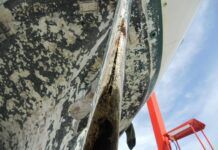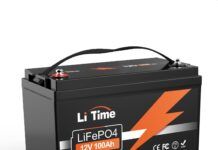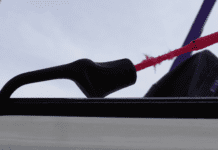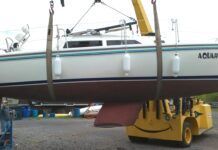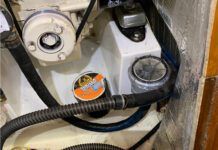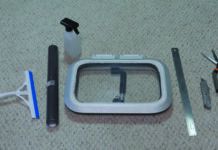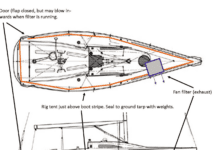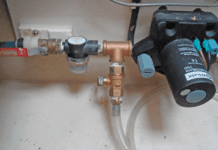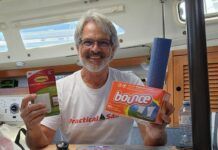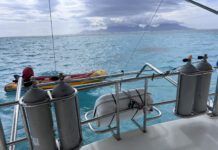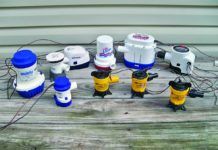Waldo Semon, a rubber scientist in the early 1920s, had been tinkering around in search of a formula that would yield a synthetic adhesive. He didn’t have much luck, but what he did manage to stumble upon was a new material with some pretty nifty properties. He called it polyvinyl chloride, or PVC, and he started experimenting by cobbling golf balls and shoe heels out of the material. From that humble beginning, PVC—commonly known as vinyl—has grown to become the world’s most versatile plastic. Today vinyl is the second largest volume plastic produced in the world.
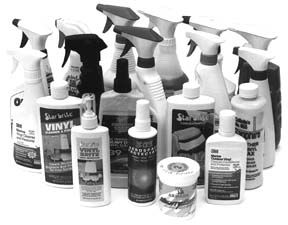
A material with infinite uses, vinyl’s low cost and versatility make it the material of choice for dozens of industries—health care, communications, electronics, fiber optics, aerospace, automotive, textiles, construction—and consumer products ranging from shower curtains to garden hoses, window blinds, footwear, credit cards and, yes, boats.
Like all plastic materials, vinyl results from a series of processing steps that convert hydrocarbon-based raw material (petroleum, natural gas, coal) into synthetic products called polymers. The vinyl polymer is unusual, however, in that it’s based only in part on hydrocarbon. The other half is based on chlorine, which in turn is derived from salt water, a readily available commodity that’s less sensitive to fluctuations in the world oil market than are totally oil-dependent polymers.
Ergo vinyl’s low cost. Add strength, durability, moisture resistance, and the ability to withstand rust and corrosion, and you can understand why boatbuilders love the stuff.
Plasticizers and ultraviolet and mildew inhibitors are used in most vinyl products you’ll see in and around boats (features that separate marine vinyl from standard vinyl). But the material still takes a beating—and it’s often a real task to clean. Take boat fenders, for instance.
Which is precisely what we did—we rounded up soiled, stained, grimy fenders—-the kind most of us hide in our lockers until needed. We figured if we could bring our ugly fenders at least partly back to life using marine-specific cleaners, then other jobs—cushions, counter tops, headliners, rubrails, and such—would be easy pickins’.
What We Tested
We chose 19 products to test, all marketed specifically as “marine” vinyl cleaners. We did try a few general cleaners like Fantastik and Formula 409, but found them only marginally effective on our badly soiled fenders, so we removed them from the running and stuck with marine-specific applications only—cleaners that are readily available through local chandleries, marine discount stores, on the Web, or that have been recommended to us by local boaters.
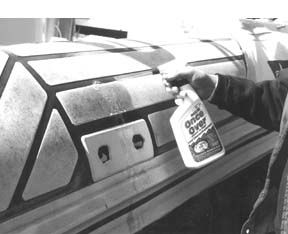
Any cleaner’s job is to remove soil and grime from a surface. A soiled surface, generally speaking, consists of solid particles of dirt bound onto the surface with an oily or greasy film. Get rid of the film and the dirt is no longer bound, and the dirt comes off easily. The problem, then, is to get rid of the oil or grease.
There are several ways to accomplish this. A solvent can be used to dissolve the oil. A detergent—a chemical that combines with water and oil—can be used to emulsify the oil and allow it to dissolve in rinse water (soap is one example of a detergent), or you can use an alkali to “saponify” the oil or grease. Saponification chemically changes the oil to a soap that will dissolve in water. You can also use an abrasive, like Bon Ami or Comet, which literally scrapes the surface clean. But since the use of abrasives runs the risk of adding scratches, we opted not to include them in our test. The products we tested represent three of these techniques, either singly or in combination, and are outlined in our Value Guide on the previous spread.
How We Tested
Following instructions on each label, we first tested each application on a vinyl bimini cover and vinyl boat cushions that had seen a season of typical use. They all did a good job of removing mildew, bug spots, food stains, oil, grease, and surface dirt. Since results were inconclusive, we decided to put these cleaners to the real test—cleaning ugly, beaten, overly abused white vinyl fenders.
We masked off sections with transparent tape (so that we could make before-and-after comparisons), and once again applied each cleaner according to the manufacturer’s instructions. This time, we found some differences.
Results
The two cleaners that required dilution—MightyBrite and Star brite’s Vinyl Shampoo—were among the least effective. The most effective were 303 Aerospace Protectant, Meguiar’s #57 Vinyl Cleaner/Conditioner, and Knight’s Marine Once Over and Marine Spray Nine.
There were substantial differences in how these cleaners are applied. Some require rinsing off—meaning extra work—others don’t. A few products incorporate wax, which provides a nice shine when you buff them.
Dispensing methods differ, too. We found the pump spray applications—at least those with a trigger grip and adjustable-spray nozzle—the easiest to use. The one-finger squeeze top sprayers (Meguiar’s 39 Heavy Duty Vinyl Cleaner, 303 Aerospace Protectant, Star brite Vinyl Brite), though more convenient than the flip-top and screw-cap products, were also easy to use, but if faced with a big job, your finger can tire quickly when it’s continually depressing a plunger. They also require pulling off and putting on a protective cap to prevent evaporation or spillage.
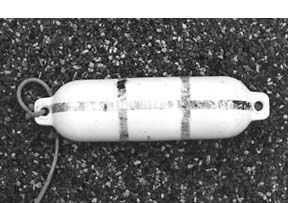
None of the products damaged our fenders’ vinyl surface, but our test was of limited duration. Over the long run, we’d be hesitant to use a solvent-based cleaner; the plasticizers, which combine with vinyl resin to act as a lubricant between the molecules to lubricate the resin and keep the vinyl soft, may be leached out by these solvents after prolonged use.
From a safety standpoint, none of these products would appear to present much of a hazard in normal use, though solvents tend to be flammable, and alkalis can be irritating to the skin and eyes. Needless to say, all these products should be kept away from small children.
Conclusions
Since we suspect that most people would rather be sailing than toiling over vinyl maintenance, we favored products that were easy, quick, and effective. Those packaged with a pump spray are easiest. Those that require only easy application (no scrubbing), then wiping off, are quickest. And those that work best at removing embedded dirt, grime and grease—all but the worst stains, scuffs and wear (more on this below)—were found to be most effective.
Although our Value Guide tells the story on each of these products (be sure to check the cost per ounce, a key buying point), Knight’s Marine Spray Nine Multi-Purpose Cleaner was our hands-down champ. It’s quick, a cinch to use (no penetration time needed, just wipe on and wipe off), it removed more ugly stuff than any of the others, and its cost-per-ounce (23 cents) makes it the most economical of all the cleaners we tested. More than a cleaner, it can also be used to disinfect; just spray on a second application, let it sit for 30-45 seconds, wipe off with a sponge or cloth, and rinse. Although Knight recommends it for a first, heavy-duty application, to be followed by a squirt of its Marine Once Over, we found the second step unnecessary.
A final note. None of these cleaners will remove deep, grimy scuffmarks, or the deeply embedded stains that are often found on well-used fenders. For those we’d recommend an initial cleaning with, say, Marine Spray Nine, a good scrubbing with Comet or Bon Ami, then a final application of, say, Sapphire Vinyl Wax to protect the finish and bring back some of the shine.
Also With This Article
Click here to view “Value Guide: Vinyl Cleaners.”
Contacts — 303 Products, P.O. Box 966, Palo Cedro, CA 96073; 530/549-5617; www.303products.com. 3M Marine, 3M Center, St. Paul, MN 55144-1000; 877/366-2746; www.3m.com/US/auto_marine_aero/marine. Armada Coatings, P.O. Box 879, Havre de Grace, MD 21078; 800/336-9320; www.armadacoatings.com. Bell Chemical, 1420 N.W. 2nd Ave., Boca Raton, FL 33432; 561/ 391-8826. Collinite, 1520 Lincoln Ave., Utica, NY 13502; 315/732-2282; www.collinite.com/marine.htm. Dolphinite, 19 Mitchell Rd., Ipswich, MA 01938; 978/356-9834; www.dolphinite.com/. Knight Marketing Corp., 251 N. Comrie Ave., Johnstown, NY 12095; 800/477-7299; www.knightmkt.com. Meguiar’s, P.O. Box 17177, Irvine, CA 92623; 800/347-5700; www.meguiars.com. MDR, 2116 Merrick Ave., Merrick, NY 11566; 516/546-1162; www.mdramazon.com. Star brite, 4041 SW 47 Ave., Ft. Lauderdale, FL 33314; 800/327-8583; www.starbrite.com. Wallace & Sons, 2675 Dobbs Rd., St., Augustine, FL 32086; 800/223-5969; www.tufenuf.com/. BoatU.S., 884 S., Pickett St., Alexandria, VA 22304; 800/937-2628; www.boatus.com. West Marine, 500 Westridge Dr., Watsonville, CA 95076; 800/262-8464; www.westmarine.com.






